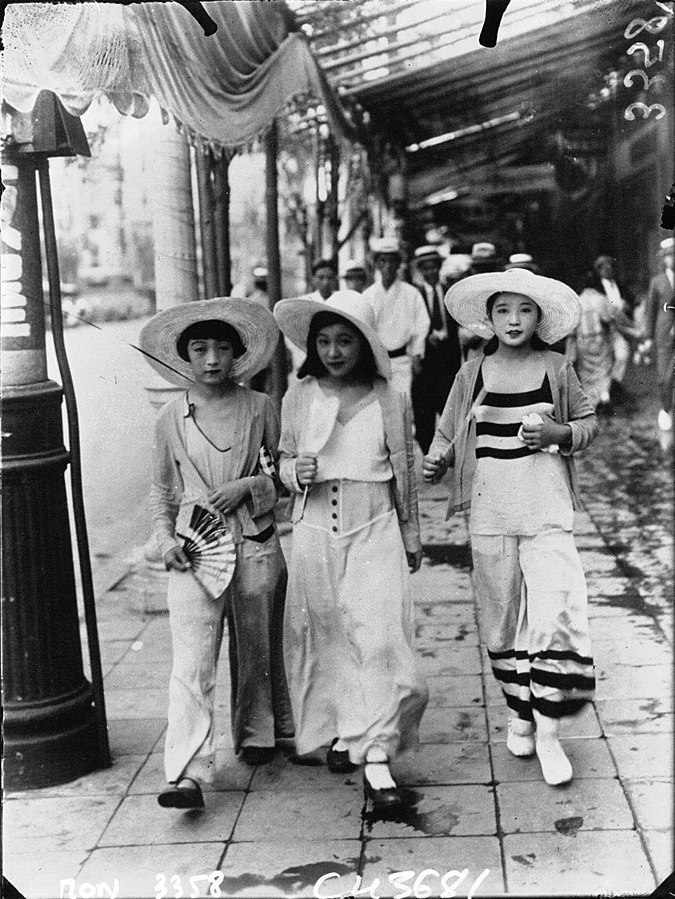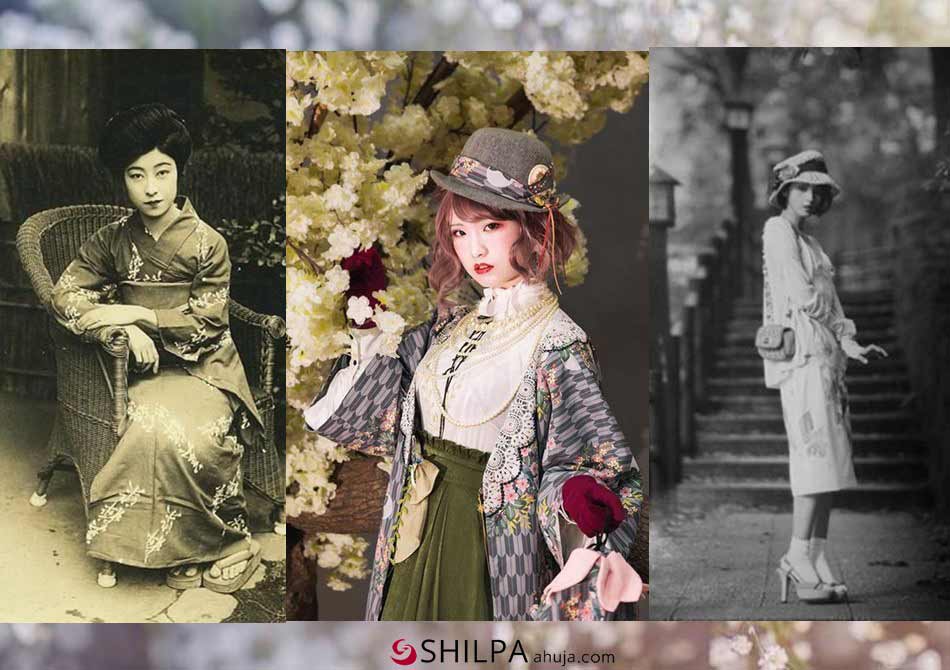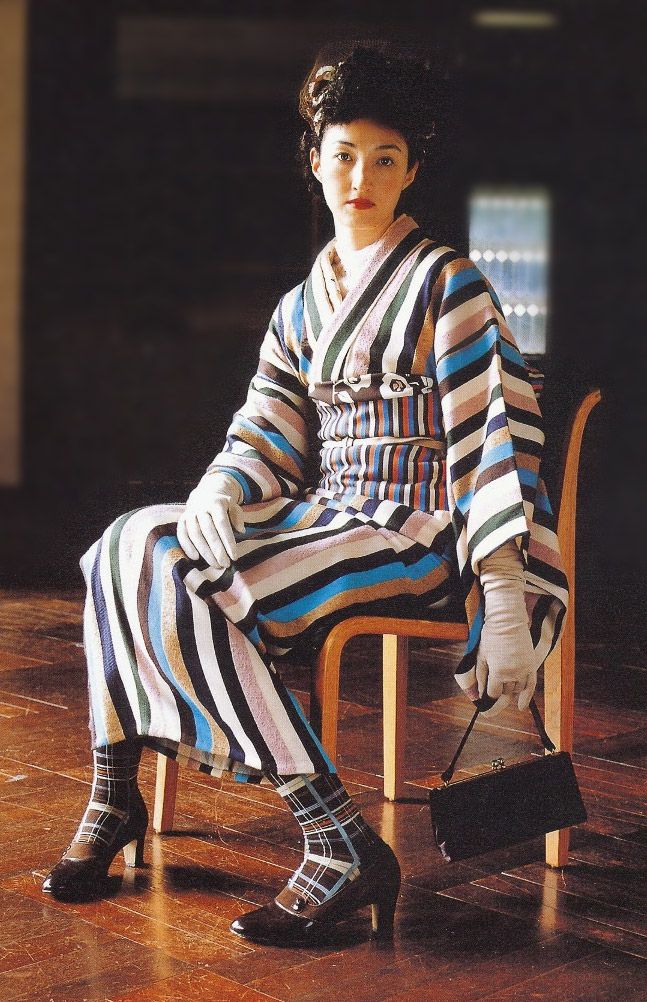
Image result for taisho era fashion now Kimono Japan, Yukata Kimono
The Taisho era (1912-1926) was a relatively short period of Japanese history nestled between the much longer Meiji (1868-1912) and Showa (1926-1989) eras. It was a time of great change, in which Western culture permeated Japanese popular culture and the average lifestyle of Japanese people changed drastically.

Taisho Roman Taisho era fashion, Taisho era, Japanese history
There are many ways to get involved with Fashion Revolution Canada! You can support our nationwide efforts to connect with brands, producers, citizens, and students and to push for policy change. You can become a student ambassador at your university, college, or high school. You can start or support a local Fashion Revolution group (current.

taisho era short hakama Ghost in the
Emergence of Modan Gāru Following the city's reconstruction after the disastrous earthquake, young girls who were sensitive to Western-influenced trends, known as modan gāru, or moga for short, started to appear in the 1920s.Dressed in the cutting-edge Western clothes and hats with cropped hair (Figure 9), Anzō Yūko and Koizumi Makiko argue that they became the symbol of modern.

Overcoat (Tonbi), Taishō period (191226) to Shōwa period (192689
While the anime takes place in the Taisho era, about when Western-style fashion became vogue in cities, the origins of Western and syncretic fashion in Japan can be found in the preceding Meiji.

Taisho Period (19121926) History, Culture and Architecture Japan
The Taisho period is a short period in Japanese history between 1912 to 1926. It was the years of democratic movements across the political, economic and cultural fields.

[Hakama] school girl uniform since around 1889 1923 in Meiji and
Taishō eraTaishō jidai [taiɕoː dʑidai] was a period in the history of Japan dating from 30 July 1912 to 25 December 1926, coinciding with the reign of Emperor Taishō [1] The new emperor was a sickly man, which prompted the shift in political power from the old oligarchic group of elder statesmen (or Imperial Diet of Japan.

Japanese Fashion A Journey From Ancient To Modern
Fashion trends At the beginning of the Meiji period, some women did adopt Western fashion, but were relatively few and far between, as all Western-style clothing was imported from Western sources.

Vtg 1912 Taisho Era Formal Furisode Kimono Gold Orange Silk Bamboo
The uptake of yofuku (Western clothing) filtered down through the classes, however many women found the new fashions impractical for Japanese living and for decades to come it was still common for women to wear kimono, increasingly paired with contrasting accessories like hats, scarves, gloves, umbrellas and handbags. Taisho: 1912-1926

Kimono Japan, Taisho period (19121926) to Shōwa period (19261989
During the Meiji and Taisho era (mid-1800s to 1920s), the arrival of Western culture changed many aspects of Japanese society, including fashion. Kimonos were still worn, but people started wearing Western clothes, often for formal events.

Pin on china
June 19, 2020 by Prerna Sharma Join us on a visual journey through the world of Japanese fashion, showcasing statements from ancient kimono styles to present Lolita street streaks. The Japanese fashion is a vast field that is a reflection of art, tradition, and freedom.

Pin on Japanese Fashion History
Taisho Era Fashion Trends: Unveiling Japan's Unique Style Statements 22 The Taisho Era: A Fusion of Tradition and Modernity 23 Western Influences on Taisho Fashion 24 The Rise of Moga: Modern Girls in Taisho Fashion 25 Traditional Influences in Taisho Fashion 26 7. World War II's Influence on Japanese Fashion: Navigating Occupation and Change

Épinglé par Reiner Gogolin 米罗 sur Photographie Enfants japonais
This can be said in the case of Japanese women's magazines in the early eras as well. More specifically, starting from the Taishō era, the women's magazine industry grew greatly. After the launch of Shufu-no-Tomo in 1917, the mass-market women's magazine became accepted and acknowledged as a distinct magazine genre.

Tomigiku & Danko Taisho Era Geiko Taisho era, Japanese outfits
1912 - 1926. The Taisho period, or Taisho era, is a period in the history of Japan dating from July 30, 1912, to December 25, 1926, coinciding with the reign of the Emperor Taisho. The new emperor was a sickly man, which prompted the shift in political power from the old oligarchic group of elder statesmen (or genro) to the Diet of Japan and.

Taisho Roman Japanese outfits, Taisho era fashion, Kimono fashion
Taisho Chic: Taisho Era Women's Fashion in Japan 61 Pins 40w T Collection by Tamar Heller Photos of Women in Western Garb 24 Pins Photos of Taisho Era Kimonos 3 Pins Photos of Women in Both Western Garb and Kimonos 4 Pins Taisho Era Kimonos and Haori Jackets 11 Pins Illustrations of Taisho Fashion (see my board on Art Nouveau and Deco Japan)

Taisho Era Fashion in Yono r/japanpics
Taisho Era| History, Culture, and Art of This Period By Janbox - 05/05/2022 3222 Japanese culture since ancient times has brought many unique and distinctive features.

Pin on Recent Projects
The Art of the In-between in Japan's Taishō Era The days of a heteronormative society seem numbered, but as an exhibition at the Yayoi Museum, Tokyo reminds us, gender fluidity isn't something that millennials invented.